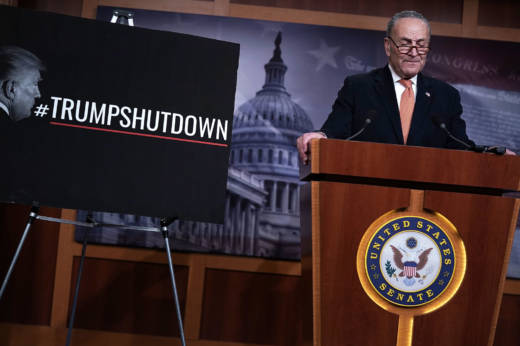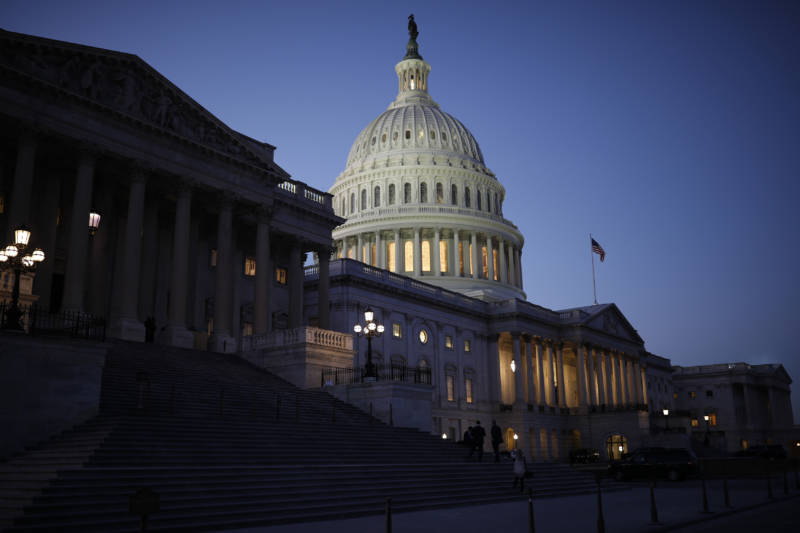Sen. Chris Van Hollen, D-Md., who leads the Senate Democrats' campaign strategy, told NPR's Weekend Edition that Trump and Schumer had a productive meeting at the White House on Friday. But after that, Van Hollen said, "the naysayers at the White House then got involved, and things went downhill from there," referring to immigration hard-liners in the administration.
Because most government offices won't open again until Monday, there is time over the weekend for legislators to reach a compromise.
The three-week proposal before the Senate on Saturday has been championed by Sen. Lindsey Graham, R-S.C., since Friday evening. Graham had opposed the longer measure for four weeks of funding, which passed in the House on Thursday but failed in the Senate early Saturday morning, just after the shutdown took effect. Throughout the evening Friday, Graham's proposal for a shorter time frame of stopgap funding seemed to be picking up steam with senators as the chamber failed to pass the House measure or to reach any larger deal on a number of issues that have been under consideration relating to spending levels, immigration and border security.
As the shutdown took effect, Senate leaders were still talking on the floor after a procedural vote late Friday lacked the 60 yes votes needed to advance the House's four-week funding bill.
Around 12:15 a.m. ET, McConnell voted no on the House measure, doing so for procedural reasons that allowed him to preserve the ability to bring up a substitute bill later. The final vote was 50-49, with Sen. John McCain, R-Ariz., absent from the vote.
The apparent congressional paralysis risked overshadowing the first anniversary of Trump's inauguration and capped off a year defined at times by chaos and frustration from both the White House and congressional Republicans despite their unified control of Washington.
And it comes after days of hurried negotiations to find a compromise failed, leading to finger-pointing from both parties eager to shift the blame.
Republicans and McConnell had been angling for a four-week continuing resolution that included extending CHIP for six years in an effort to entice Democrats to vote for the insurance program they want to fund.
But Democrats, led by Schumer, pushed to include an immigration measure that would include a pathway to citizenship for roughly 700,000 immigrants enrolled in the DACA program the Trump administration rescinded last year.
Republicans blamed Democrats for angling for the DACA legislative fix over keeping the government open, using the hashtag #SchumerShutdown and launching an accompanying website focused on Schumer.
Shortly before midnight, the White House released a statement blasting Democrats as "obstructionist losers."
"Senate Democrats own the Schumer Shutdown. Tonight, they put politics above our national security, military families, vulnerable children, and our country's ability to serve all Americans. We will not negotiate the status of unlawful immigrants while Democrats hold our lawful citizens hostage over their reckless demands. This is the behavior of obstructionist losers, not legislators," White House press secretary Sarah Huckabee Sanders said.
Just after midnight, McConnell took the Senate floor to fault Democrats for not backing the House bill and averting a shutdown.
"What we have just witnessed on the floor was a cynical decision to shove aside millions of Americans for the sake of irresponsible political gains," the GOP leader said. "A government shutdown was 100 percent avoidable, completely avoidable. Now it is imminent all because Senate Democrats chose to filibuster a noncontroversial funding bill that contains nothing — not a thing — that they do not support."
However, the hashtag #TrumpShutdown was also trending on Twitter late Friday night, and Democrats believe that it's Republicans who will end up shouldering the majority of blame from the public given that the GOP controls both Congress and the White House.
Trump appeared to complicate efforts to reach a compromise over the past weeks, at first signaling he would sign any immigration deal but then rejecting a bipartisan proposal, bending to his conservative, hard-line base and insisting any deal had to have funding for his trademark border wall. Negotiations further stalled after Trump reportedly used a vulgarity in questioning why the U.S. should welcome immigrants from Africa instead of from places like Norway. (Trump has denied that he used that language.)
Schumer took to the Senate floor immediately after McConnell early Saturday and said that when he met with Trump at the White House on Friday, he had put the border wall on the negotiating table in order to reach a compromise on DACA. But "even that was not enough to entice the president to finish the deal," Schumer said, accusing Trump and Republicans of "rooting for a shutdown," which he said would "crash entirely" on the president's shoulders.
"What happened to the president who asked us to come out with a deal and promised he'd take heat for it? What happened to that president? He backed off at the first sign of pressure," Schumer said.
Polling released Friday from both Washington Post/ABC News and CNN found that most Americans would blame Trump and Republicans over Democrats in the event a shutdown occurred. However, CNN also found a majority said approving a budget deal was more important than finding a way to advance DACA.
As NPR's Brian Naylor reported, if the shutdown continues, essential services will continue and essential workers would remain on the job, though they would be unpaid. Active-duty military will stay in service, along with post offices. In a change from the last time the government shut down in October 2013, the Interior Department announced it will work to keep national parks open and "as accessible as possible."

